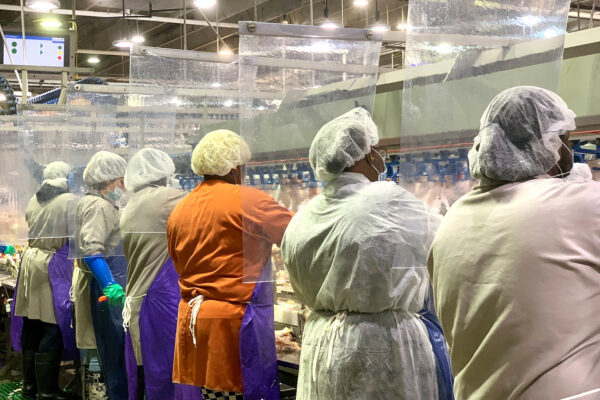Meat Processors Adopt Robotics, Automation After CCP Virus Shutdowns
American meat processing giants are speeding up efforts to automate their meat-packaging operations,..
American meat processing giants are speeding up efforts to automate their meat-packaging operations, according to robotics industry specialists.
The move comes as meat processors count the costs of the CCP (Chinese Communist Party) virus crisis.
The United Food and Commercial Workers Union (UFCW) said that over 14,000 of its members working at meat packaging plants had contracted or been exposed to the CCP virus, resulting in at least 65 deaths.
The UFCW also said it would be supporting a House of Representatives bill—the Safe Line Speeds in COVID-19 Act—to reduce production line speeds in meat factories, and criticized USDA waivers (pdf) to meat processors that allow higher speeds in exchange for sharing internal food safety data.
In a statement, UFCW President Marc Perrone said that “Americas meat packing workers have been on the frontlines of this pandemic since day one, putting themselves in harms way to make sure our families have the food we need.” Perrone said action must be taken to reduce line speeds in meat plants “to ensure workers can maintain social distancing and stay safe on the job.”
The U.S. Department of Labors Occupational Safety and Health Administration (OSHA) issued a new poster this week (pdf) that lists safety tips for employers and employees to protect workers in the meat packing industry from exposure to the CCP virus.

Cargill Inc. said in a statement that the company has adopted a raft of measures at its North American protein facilities to protect workers against the CCP virus, such as employee temperature measurement, screening measures, facemasks, and prohibiting visitors at plants.
Now companies like Tyson Foods are striving to replace human workers with machines and robots, spending over $215 million over the last 5 years on automation and robotics.
A wide range of end-of-line procedures such as packaging, bagging, labeling, box folding and closure, and carton palletizing have been common in the industry for years. Sophisticated sensor-based systems are also available that stop band saws within milliseconds of the operator touching the blade—greatly reducing the risk of serious cuts and amputation.
As well as virtually eliminating the risk of production stoppages due to viral epidemics, new automation and robotics technologies mean that back-breaking tasks such as boning, cutting, sawing, and hefting animal carcasses could soon be a thing of the past.
Existing technologies such as X-ray systems and high-resolution imaging technologies are being adapted to identify where bones lie in a cut of meat, allowing knives mounted on robot arms to remove the bones with a minimum of waste. Other scanning devices can create 3-D models of a joint of meat, for example, ensuring that robot positioning systems can lift and turn heavier joints correctly to allow precise cuts to be made.
Tyson Foods opened its state-of-the-art Manufacturing Automation Center in Springdale, Arkansas in August 2019 with the aim of developing new manufacturing solutions. The company said the facility would develop advanced automation, robotics, machine learning, and machine vision technologies.
Health & Safety
Worker safety was an issue in the meat processing industry long before the CCP virus came to the United States. According to the OSHA at the U.S. Department of Labor, there are many serious safety and health hazards in the U.S. meat packing industry.
“These hazards include exposure to high noise levels, dangerous equipment, slippery floors, musculoskeletal disorders, and hazardous chemicals,” according to the OSHA. “Musculoskeletal disorders (MSDs) comprise a large part of these serious injuries and continue to be common among meat packing workers.” Workers using band saws to cut animal bones also experience a higher risk of amputation.
A 2013 report (pdf) from the OSHA stated that the rate of occupational illness in the poultry processing industry in 2011 and 2012 was five times the U.S. industrial average. In addition, the incidence of carpal tunnel syndrome in poultry processing was seven times the natiRead More – Source

